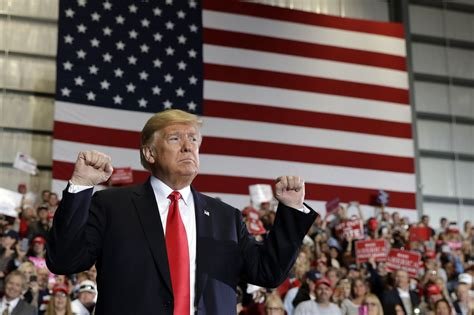
Understanding Trumpism: A Political Phenomenon Unveiled
Unraveling the Essence of Trumpism and Its Impact on American Politics
In the realm of contemporary American politics, one term has reverberated across the nation, sparking fervent debates and reshaping the political landscape: Trumpism. This article delves deep into the labyrinth of Trumpism, dissecting its definition, historical roots, core ideology, criticisms, and its profound influence on both the Republican Party and the United States as a whole.
Defining Trumpism
At its core, Trumpism is a political ideology intrinsically tied to the 45th U.S. President, Donald Trump. However, it transcends mere personality cult, representing a set of beliefs and practices that have disrupted conventional political norms and expectations.
The Historical Underpinnings
The origins of Trumpism can be traced back to the watershed moment of the 2016 Presidential campaign when Trump secured an unexpected victory. This outcome sent shockwaves through the political establishment, as Trump tapped into the sentiments of a significant portion of the electorate who felt marginalized by the forces of globalization and changing societal norms. His iconic slogan, “Make America Great Again,” resonated deeply with these voters.
The Ideology Unveiled
Core Tenets and Principles
Trumpism is underpinned by a distinctive set of beliefs and principles that encompass economic policies, social views, and foreign affairs.
Economic Policies: Trumpism is synonymous with protectionism and economic nationalism. The 2017 tax reform, marked by reduced corporate taxes to stimulate domestic investment, exemplifies this approach. Additionally, Trump’s assertive stance on trade, including tariffs on Chinese imports, reflects a commitment to safeguarding American industries.
Social Views: Socially, Trumpism leans towards conservatism, evident in the administration’s actions such as the rollback of LGBTQ rights and the appointment of conservative judges. It also advocates for stricter immigration controls, exemplified by policies like the travel ban affecting several Muslim-majority countries.
Foreign Policies: Trumpism’s foreign policy prioritizes American interests over international commitments. Withdrawal from the Paris Agreement and the Iran Nuclear Deal underscore this approach, as does the preference for bilateral negotiations, as seen in discussions with North Korea.
Critiques and Controversies
Unsurprisingly, Trumpism has ignited both ardent supporters and vehement critics.
Supporters’ Views: Proponents of Trumpism laud its focus on America’s interests, its economic achievements, and its no-nonsense approach to politics. Many view it as a much-needed departure from political correctness and empty promises.
Opponents’ Views: Detractors argue that Trumpism is divisive and undermines democratic values. They highlight policies that are perceived as xenophobic or racially biased, as well as actions such as the dismissal of FBI Director James Comey, which raise concerns about democratic norms.
The Impact of Trumpism
On the Republican Party: Trumpism has left an indelible mark on the Republican Party, leading to internal divisions and debates. The party’s reluctance to challenge Trump during his impeachment trials underscores the profound influence of Trumpism within its ranks.
On the United States: Domestically, Trumpism has significantly shaped policies, ranging from tax reform to healthcare. Deregulation of industries and changes in environmental policies reflect the pro-business orientation of Trumpism.
Globally: Trumpism’s influence extends beyond U.S. borders. The renegotiation of trade agreements, skepticism towards NATO commitments, and the forging of new alliances, such as the Abraham Accords in the Middle East, signal a distinct foreign policy approach.
Legacy and the Future of Trumpism
Trumpism Without Trump: A pressing question revolves around the sustainability of Trumpism in the absence of its namesake. Debates persist on whether it will endure as a force within the Republican Party or diminish without its charismatic figurehead.
Future Projections: Predicting the trajectory of Trumpism remains a complex undertaking. While some envision it as a lasting influence on American politics, others anticipate its decline as a reaction to evolving events. The upcoming 2022 mid-term elections could offer valuable insights into the endurance of Trumpism.
The Ongoing Discourse
The discourse surrounding Trumpism continues to evolve, shaping American politics and its place on the global stage. As we explore this multifaceted phenomenon, it is essential to address common questions and provide a comprehensive understanding.
Frequently Asked Questions
-
What is Trumpism? Trumpism is a political ideology associated with former U.S. President Donald Trump, emphasizing nationalism and populism.
-
Is Trumpism limited to the United States? While primarily American, Trumpism’s sentiments resonate with similar movements worldwide.
-
How has Trumpism changed the Republican Party? It has sparked debates and divisions, reshaping the party’s ideology and direction.
-
Can Trumpism exist without Donald Trump? Opinions vary, but many believe it may continue to influence American politics.
-
What are the main criticisms of Trumpism? Critics cite divisiveness, potential xenophobia, and undermining democratic norms as major concerns.
Exploring Further
To gain deeper insights into Trumpism and its implications, consider these additional resources: